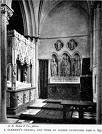Richard Durnford 1802 - 1895
August 31, 2009
Richard
Durnford 1802 - 1895 was a British Vicar, Rector of Middleton
(from 1835 - 1870) at
St. Leonard’s Church,
and then Bishop of Chester until his death.
In 1851, Richard Durnford was was on the Management Committee of the Manchester Homeopathic Hospital, alongside William Armitage, Henry Dixon, Francis Egerton 1st Earl of Ellesmere, J MacDowall, John Edward Norton, Edward Phillips, Alfred Crosby Pope, Charles Caulfield Tuckey, Robert Walker, Thomas Egerton 2nd Earl of Wilton, and many others.
Richard Durnford spoke at length about the need for a homeopathic Hospital in Manchester, and he praised homeopaths for their ardent study of great medical texts, alongside the works of Samuel Hahnemann. Richard Durnford also praised the homeopaths for their fortitude against the coldness and emnity of the allopaths, and the sacrifices they had made to uphold their Truth, thus is was the duty of people who uphold such Truth to step forward to support them.
In 1851, Richard Durnford was a member of the Association for the Protection of Homeopathic Students and Practitioners.
In 1851, a public meeting was held in Manchester, where William Armitage, Henry Dixon, Richard Durnford, William Philip Harrison, Walter R Johnson, George Stevenson Knowles, Alfred Crosby Pope, William W Scholefield, Charles Caulfield Tuckey, Arthur de Noe Walker and many others, decided that homeopathy required the protection of a Royal Charter or a Legal Enactment to protect it from their enemies, and they proposed that a Branch of the General Association for the Protection of Homeopathic Students and Practitioners be immediately set in motion, noting that in London an Association for the Protection of Homeopathic Students and Practitioners was already up and functioning.
**Obituary from the Pall Mall Gazette: **To have been born in 1802 and to have lived till 1895; to have been William Ewert Gladstone’s senior at Eton: to have been flogged by John Keate (note: famous headmaster at Eaton known for his flogging), and subsequently to have married his daughter; to have taken his degree while George IV was King; to have been ordained in the year that Williams IV came to the throne: to have been a Bishop for twenty seven years - these achievements would have been established a record for Dr. Durnford had he no other claims to fame.
He was a churchman of the old school of “high and dry” who, caring for the due and proper performance of the ritual of the Church, cared more for the things which the ritual symbolized.
He took very literally the pastoral view of a clergyman’s functions, and he busied himself more with the welfare of his own flock than with the conflicts that were disturbing other sheepfolds.
There were never any troubles in his parish or in his diocese. And so his name scarcely came before the public. Yet he was a ruler and those over whom he ruled so long will deeply regret the disappearance - even at the ripe age of ninety two - of him who was till yesterday, Bishop of Chichester.
Richard Durnford had two sons, Richard Durnford Jr., former secretary of the Charity Commission, and Walter Durnford.
Of interest:
’… December 1844, Garth Wilkinson _[James John Garth Wilkinson] took his first step with homeopathy, in a letter to Henry James senior, Garth Wilkinson explained: ‘… We have committed him [James John Wilkinson junior was suffering from bronchitis and whooping cough] to homeopathy, and called in Dr. Durnford who has been very kind in his attentions, although but little marked improvement has yet taken place… (Clement John Wilkinson, *James John Garth Wilkinson: a memoir of his life, with a selection of his letters, (Kegan Paul, Trench, Trübner, 1911). Page 246)*…’_
 Bishop
Durnford’s tomb at Chichester
Cathedral
Bishop
Durnford’s tomb at Chichester
Cathedral